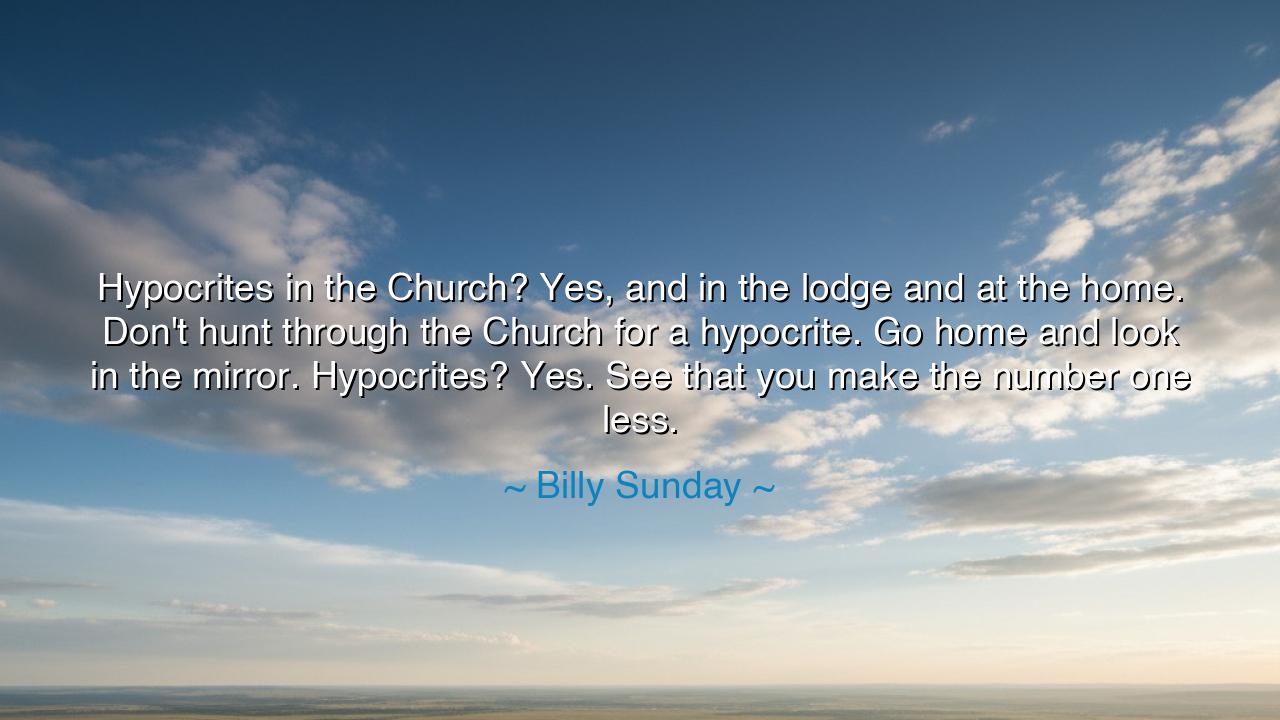
Hypocrites in the Church? Yes, and in the lodge and at the home.
Hypocrites in the Church? Yes, and in the lodge and at the home. Don't hunt through the Church for a hypocrite. Go home and look in the mirror. Hypocrites? Yes. See that you make the number one less.






In the fiery and uncompromising words of Billy Sunday, the great evangelist of the early twentieth century, we hear the thunder of a prophet and the wisdom of a reformer: “Hypocrites in the Church? Yes, and in the lodge and at the home. Don’t hunt through the Church for a hypocrite. Go home and look in the mirror. Hypocrites? Yes. See that you make the number one less.” This declaration burns with the force of truth — a call to self-examination, humility, and moral courage. In his era, as in ours, people were quick to condemn the failures of institutions and others, yet slow to confront their own. Billy Sunday, like the prophets of old, struck at the heart of that human weakness: the tendency to see evil everywhere except within ourselves.
Sunday was not a man of idle words. Once a professional baseball player turned preacher, his sermons were electric — filled with fire, movement, and conviction. He spoke in tents and churches to thousands who came seeking revival. Yet he did not flatter them. He reminded them that the Church, though sacred, was made of flawed souls. To accuse it of hypocrisy, he said, was to forget that every congregation is a mirror of humanity. “Go home and look in the mirror,” he challenged — for the face reflected there is not free of imperfection. His quote exposes a timeless truth: that the greatest obstacle to purity is not corruption in others, but blindness in ourselves.
The ancients understood this truth long before the days of Sunday. In the temple of Apollo at Delphi, inscribed upon the stone, were the words: Know thyself. It was a command to introspection — a reminder that the soul’s first duty is self-knowledge. Many seek to reform the world without first reforming themselves. They build laws for others but live lawlessly in their own hearts. This is the hypocrisy that Billy Sunday condemned — not the failure of humanity to be perfect, but the arrogance of pretending to be so while condemning others for their flaws. To cleanse the Church, the family, or the nation, one must begin, as Sunday said, with the person in the mirror.
Consider the story of Leo Tolstoy, the great Russian writer. Late in life, he became consumed by questions of morality and faith. He renounced wealth and sought spiritual truth, but in doing so, he judged his family harshly, growing bitter toward those who did not share his zeal. Only near the end of his life did he realize that his self-righteousness had become its own kind of sin — a pride cloaked in piety. His awakening mirrors Sunday’s message: that no good work, no moral cause, is pure if the heart behind it is proud. True righteousness begins not with judgment, but with repentance — the willingness to confront one’s own duplicity before speaking of another’s.
Billy Sunday’s words also strike at the roots of modern hypocrisy, where moral outrage often substitutes for moral effort. It is easy to denounce corruption in others; far harder to uproot it within oneself. The man who rails against greed but cheats in small things, the woman who preaches love but holds bitterness, the leader who demands virtue but hides vice — these are the mirrors of Sunday’s warning. “See that you make the number one less,” he says — meaning, reduce hypocrisy not by counting others’ sins, but by cleansing your own. If each person removed the hypocrisy within, the world would need fewer judges and more healers.
The message is both humbling and empowering. For it is not the recognition of imperfection that weakens us, but honesty that redeems us. To admit one’s faults is not to fall — it is to rise. The ancient Stoics believed that the wise man examines his conscience daily, asking, “Where did I fail? Where can I do better?” Sunday’s challenge echoes this discipline. The mirror becomes not a source of shame, but a teacher — one that shows both our weakness and our divine potential. The hypocrite hides from reflection; the righteous faces it bravely, knowing that truth, though painful, purifies the soul.
The lesson, then, is eternal: before you seek to reform the world, reform yourself. Before you condemn the Church, the state, or your neighbor, cleanse your own spirit. Do not hunt for hypocrites in others — the hunt must begin and end within. Let your words and deeds match; let your inner life shine brighter than your outer image. In doing so, you will not only make “the number one less,” as Sunday said, but also make the world more honest, more humble, and more just.
So, dear listener, remember the fierce wisdom of Billy Sunday. When next you are tempted to judge the failings of others, pause and look into your own reflection. Ask yourself: Am I living the truth I demand of others? For the reformer without humility is but another hypocrite in disguise. But the one who begins with self-examination becomes, like the ancients taught, a true servant of the divine — a beacon of authenticity in a world of pretense. Thus, in lessening the hypocrite within, you lessen hypocrisy without — and the number of the false among us grows smaller by one.






AAdministratorAdministrator
Welcome, honored guests. Please leave a comment, we will respond soon